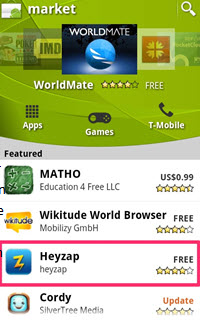 Heyzap launched a way for gamers to “check in” to mobile games on Android a couple of months ago and has already reached 4.6 million users.
Heyzap launched a way for gamers to “check in” to mobile games on Android a couple of months ago and has already reached 4.6 million users.
A total of 72 games use Heyzap’s platform, which creates a social network on top of Android where users can show others what games they are playing at any given moment. The progress shows that the “check-in” phenomenon created by Foursquare can also work to create interest-based groups on mobile platforms. And these interest groups can become social networks unto themselves, creating value because they bring together users who want to get to know each other.
 Heyzap has basically added a social layer on top of Android. Gamers can share games with each other, helping to solve the big discovery problem on mobile platforms, where there are hundreds of thousands of apps and no fantastic way to sort through them all. The platform makes games more viral and discoverable.
Heyzap has basically added a social layer on top of Android. Gamers can share games with each other, helping to solve the big discovery problem on mobile platforms, where there are hundreds of thousands of apps and no fantastic way to sort through them all. The platform makes games more viral and discoverable.
“We are creating the social graph of mobile games,” said Jude Gomila, co-founder of Heyzap in San Francisco.
Developers integrate the Heyzap mobile software development kit into their Android games. Some of the top games that use Heyzap include Crazy Snowboard, XConstruction Lite, Math Maniac, and Slot Machine. Gomila downloaded a bunch of the games himself and wound up with 200 titles that maxed out the available storage on his phone.
One of the cool things about the platform is that it reveals which games are the hottest at any given moment. Once the number of users becomes much bigger, the system should deliver very useful analytics for developers. Already, the developers get a dashboard view of how their apps are spreading through mobile platforms.
Heyzap has raised $3.65 million from Union Square Ventures. The company was founded in 2008 by Gomila and Immad Akhund. Rivals include OpenFeint, Scoreloop, Ngmoco and PapayaMobile.
Once a user checks in, he or she can share information with friends on Facebook, Twitter and Heyzap’s own network. Right now, Heyzap wants the technology to spread fast and so isn’t monetizing the app. The company’s core business is monetizing just fine and allows Heyzap to experiment and invest in new platforms in pursuit of a larger user base, Gomila said. Once it has the user base, it will figure out how to monetize.



